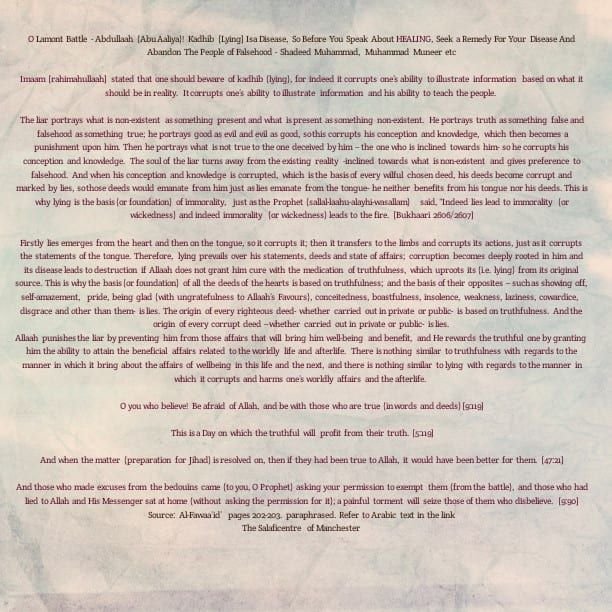Innovations and Innovators : The Stance of the Muslim Who Cares For His Religion.
Linguistically bid’ah (innovation) means ‘a newly invented matter’. The Sharee’ah definition of bid’ah is: “A newly invented way [beliefs or action] in the religion, in imitation of the Sharee’ah (prescribed Law), by which nearness to Allaah is sought, [but] not being supported by any authentic proof – neither in its foundations, nor in the manner in which it is performed.” Al-I’tisaam of ash-Shaatibee (1/37).
The Messenger of Allaah (sallallaahu alaihi wasallam) said: “Every innovation is misguidance and going astray” Reported by Abu Daawood (no. 4607), at-Tirmidhee (no. 2676) and it is saheeh. Ibn Hajr authenticated it Takhreej Ahaadeeth Ibn ul-Haajib (1/137).
And he (sallallaahu alaihi wasallam) also said: “… and every innovation is misguidance and all misguidance is in the Hellfire.” Reported by an-Nasaa’ee (1/224) from Jaabir bin Abdullaah and it is saheeh as declared by Shaikh ul-Islaam Ibn Taymiyyah in Majmoo’ ul-Fataawaa (3/58).
The Messenger (sallallaahu alaihi wasallam) also warned against the People of Innovation, from befriending, supporting or taking from them saying: “Whoever innovates or accommodates an innovator then upon him is the curse of Allaah, His Angels and the whole of mankind.” Reported by Bukhaaree (12/41) and Muslim (9/140)
And in his footsteps, we find the Noble Companions and the Taabi’een after them warning from the danger of innovations upon the Ummah, its people and their unity, since it is innovations which have divided the Ummah and split it asunder.
Ibn Abbaas (d. 68H) said: “Indeed the most detestable of things to Allaah are the innovations.” Reported by al-Bayhaqee in as-Sunan al-Kubraa (4/316)
Ibn Umar (d. 84H) said: “Every innovation is misguidance, even if the people see it as something good.” Reported by Abu Shaamah (no. 39)
Sufyaan ath-Thawree (d. 161H) said:”Innovation is more beloved to Iblees than sin, since a sin may be repented from but innovation is not repented from.” Reported by al-Laalikaa’ee (no. 238)
Al-Fudayl bin ‘Iyaad (d. 187H) said: “I met the best of people, all of them people of the Sunnah and they used to forbid from accompanying the people of innovation.” Reported by al-Laalikaa’ee (no.267)
Al-Hasan al-Basree (d. 110H) said: “Do not sit with the people of innovation and desires, nor argue with them, nor listen to them.” Reported by ad-Daarimee in his Sunan (1/121)
Ibraaheem bin Maysarah (d.132H) said: “Whoever honours an innovator has aided in the destruction of Islam.” Reported by al-Laalikaa’ee (1/139).
Sufyaan ath-Thawree (d. 161H) said: “Whoever listens to an innovator has left the protection of Allaah and is entrusted with the innovation.” Reported by Abu Nu’aym in al-Hilyah (7/26) and Ibn Battah (no.444).
Imaam Maalik (d. 179H) said: “How evil are the people of innovation, we do no give them salaam.” Reported by al-Baghawee in Sharh us-Sunnah (1/234).
Imaam ash-Shaafi’ee (d. 204H) said: “That a person meets Allaah with every sin except Shirk is better than meeting Him upon any one of the innovated beliefs.” Reported by al-Bayhaqee in al-I’tiqaad (p.158)
Al-Fudayl bin ‘Iyaad (d. 187H) said: “Whoever sits with a person of innovation, then beware of him and whoever sits with a person of innovation has not been given wisdom. I love that there was fort of iron between me and a person of innovation. That I eat with a Jew and a Christian is more beloved to me than that I eat with a person of innovation.” Reported by al-Laalikaa’ee (no.1149)
Al-Layth bin Sa’d (d. 175H) said: “If I saw a person of desires (i.e. innovations) walking upon the water I would not accept from him.” So Imaam as-Shaafi’ee then said: “He (al-Layth) has fallen short. If I saw him walking in the air I would not accept from him.” Reported by as-Suyooti in al-Amr bil ‘Ittibaa wan-Nahee anil Ibtidaa’.
Al-Fudayl bin ‘Iyaad said: “If a man comes to a person to consult him and he directs him to an innovator, then he has made a deception of Islaam. Beware of going to a person of innovation for they divert [people] from the truth.” Sharh Usool ul-I’tiqaad of al-Laalikaa’ee (no.261)
Innovations and Innovators : The Stance of the Muslim Who Cares For His Religion.
Author: Translation by Abu ‘Iyaad as-Salafi
Article ID : BDH050003 [6862]
http://www.salafipublications.com/sps/sp.cfm?subsecID=BDH05&articleID=BDH050003&articlePages=1











